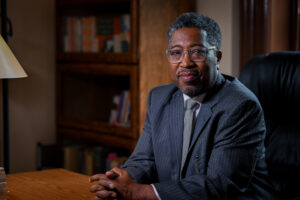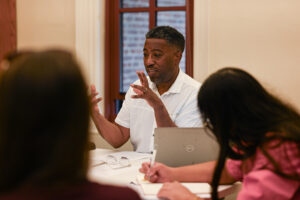Bringing community to a seemingly solitary endeavor
 The image of a writer often conjures up visions of an author sequestered away crafting the perfect poem or buried under stacks of paper finishing their next novel. However, award-winning poet and Gertrude Conaway Professor of English Major Jackson believes it is a deeply collaborative process that relies heavily on community.
The image of a writer often conjures up visions of an author sequestered away crafting the perfect poem or buried under stacks of paper finishing their next novel. However, award-winning poet and Gertrude Conaway Professor of English Major Jackson believes it is a deeply collaborative process that relies heavily on community.
“I think the conception is that writing is a solitary act,” said Jackson. “And yes, it’s true, but once a book hits the marketplace, there’s so many people who have helped usher into the world that single vision.”
Jackson began teaching at Vanderbilt in 2021 and has since made it his mission to help nurture emerging authors, hoping to quicken their learning curve and support their dream of writing their first book.
“I love teaching students here at Vanderbilt,” Jackson said. “Many of them come from backgrounds far different from my own, and yet what bonds us is a love of storytelling and a love of language, and they bring that into the classroom.”
Currently the director of the creative writing program, Jackson has helped shape the MFA Program in Creative Writing, creating a close-knit, nurturing, and intimate environment. Admitting three students in fiction and poetry per year, the program provides one-on-one mentoring and hands-on experiences that help students polish their craft.
One way he does this is through the Gertrude and Harold Vanderbilt Reading Series, newly branded as VandyLit, a program that has been offered at Vanderbilt for over 50 years. Also open to the public, the series brings leading contemporary writers to campus to read their works and visit classes. Featured guests include alumni of the Vanderbilt creative writing program who have published their work. The series gives current students, as well as aspiring writers in the community, the opportunity to discuss the craft of writing with some of the best authors of today.
In collaboration with the Office of the Chancellor and Vanderbilt University Press, the MFA Program in Creative Writing also established the Vanderbilt University Literary Prize earlier this year. Awarded annually, the prize recognizes the sole author of a full-length collection of poetry that demonstrates great poignancy combined with rigor in form, language, and artistic vision. The prize recipient’s manuscript is published, and they receive a $10,000 honorarium, an invitation to read in VandyLit, and a one-week residency on campus to engage students and local writers in the Nashville community.
“In the case of first book authors, it’s a very tender moment of growth,” Jackson said. “A lot of times, they have the facility, they have the imagination, and what they need is help professionalizing into their journey.”
Jackson’s personal path to becoming the accomplished writer he is today was built on community and mentorship. In particular, he references two mentors, poets Garrett Hongo and Sonia Sanchez, as having an enormous impact on his craft. These mentors discussed the technical side of poetry with him, such as admiring the syntax of a sentence, but they also modeled a way of being and thinking in the world—both of which he hopes to pass on to his students.
“What they gave me and what I want to give to my students is an affirmation,” said Jackson. “Many students are still trying to find their place. Taking a class in creative writing not only gives them a space in which they can live within their own thoughts and imagination, but they are expected to be creative. They are expected to imagine, to envision.”
Finding a voice as an author is a challenge that Jackson has also had to overcome. While he always had a passion for poetry, Jackson majored in business as an undergraduate and worked as an accountant at a nonprofit arts institution after graduation.
At the suggestion of a friend, Jackson applied to a fellowship that allowed him to write for two years, fully funded. This opportunity took his life in a completely different direction: following the fellowship, Jackson went on to win the Cave Canem Prize for his first book of poetry, Leaving Saturn. The prize is awarded to the best debut collection of poems submitted by a Black poet.
“I was excited my work would be out in the world in a very official way, but I was also absolutely terrified that I had opened the door to a slew of judgement from critics or readers,” he said.
While Jackson had experienced community and mentorship in his writing up to that point, the process of getting Leaving Saturn published solidified the concept for him.
“When you see a book, there’s probably 30 or more people behind that help it come into being—not to mention the role that family, a partner, or even a boss may play in supporting an artist. Marketing, editorial teams, legal. Lawyers, research assistants, copy editors, publicity. It’s an amazing gentle ushering of a vision into the world.”
This community support and collaboration is what Jackson hopes to bring to student writers through his teaching and his leadership in establishing the Vanderbilt University Literary Prize.
“What I’m trying to do here at Vanderbilt is recreate the dynamic of inspiration that surrounds you when you’re in a community,” he said. “Through the creative writing program and all the welcoming faculty and supportive staff of the English department who make it happen, I want my undergraduate and graduate students to be grounded in their decision to become writers. There’s a level of growth that happens when you confront your own creativity and imagination and allow yourself to be free inside, to create stories that may fall outside the mainstream, or to write poems that say the unsayable. I’m really excited when my students experience growth both on and off the page.”
A Portrait of Society with Poet Major Jackson
Sit down with Jackson as he discusses his path to becoming a poet, as well as his take on how the craft humanizes and records our experiences, current events, and our place in the world.
